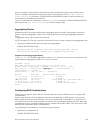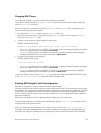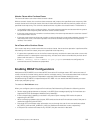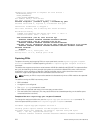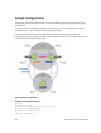Most Dell Networking OS BGP IPv4 unicast commands are extended to support the IPv4 multicast RIB
using extra options to the command. For a detailed description of the MBGP commands, refer to the Dell
Networking OS Command Line Interface Reference Guide.
• Enables support for the IPv4 multicast family on the BGP node.
CONFIG-ROUTER-BGP mode
address family ipv4 multicast
• Enable IPv4 multicast support on a BGP neighbor/peer group.
CONFIG-ROUTER-BGP-AF (Address Family) mode
neighbor [ip-address | peer-group-name] activate
BGP Regular Expression Optimization
Dell Networking OS optimizes processing time when using regular expressions by caching and re-using
regular expression evaluated results, at the expense of some memory in RP1 processor.
BGP policies that contain regular expressions to match against as-paths and communities might take a
lot of CPU processing time, thus affect BGP routing convergence. Also, show bgp commands that get
filtered through regular expressions can to take a lot of CPU cycles, especially when the database is large.
This feature is turned on by default. If necessary, use the bgp regex-eval-optz-disable command in
CONFIGURATION ROUTER BGP mode to disable it.
Debugging BGP
To enable BGP debugging, use any of the following commands.
• View all information about BGP, including BGP events, keepalives, notifications, and updates.
EXEC Privilege mode
debug ip bgp [ip-address | peer-group peer-group-name] [in | out]
• View information about BGP route being dampened.
EXEC Privilege mode
debug ip bgp dampening [in | out]
• View information about local BGP state changes and other BGP events.
EXEC Privilege mode
debug ip bgp [ip-address | peer-group peer-group-name] events [in | out]
• View information about BGP KEEPALIVE messages.
EXEC Privilege mode
debug ip bgp [ip-address | peer-group peer-group-name] keepalive [in | out]
• View information about BGP notifications received from or sent to neighbors.
EXEC Privilege mode
220
Border Gateway Protocol IPv4 (BGPv4)




